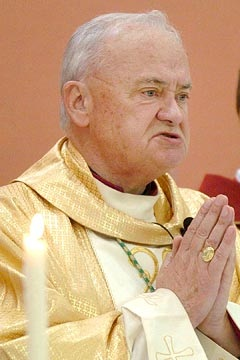Irish Bishop Resigns Over Clerical Sexual Abuse
-

The Vactican has accepted the resignation of Irish Bishop John Magee, who was accused of mishandling complaints against priests.
(March 24) – The Vatican today accepted the resignation of a prominent Irish bishop who for years failed to report to police sexual abuse allegations involving two priests in his diocese.
Bishop John Magee, who served as a personal assistant to three popes, has been under fire for more than a year for apparently caring more about the welfare of the accused priests than of their alleged victims. Neither of the two priests have faced criminal charges.
"To those whom I have failed in any way, or through any omission of mine have made suffer, I beg forgiveness and pardon," Magee said in a statement. The 73-year-old bishop had handed over day-to-day responsibilities for his diocese in the south of Ireland a year ago.
Magee's resignation came just days after Pope Benedict XVI issued a pastoral letter to Irish Catholics squarely blaming Irish bishops for "serious mistakes" in confronting sexual abuse charges.
The church is facing similar allegations in Germany, Netherlands and Austria, where investigations suggest a pattern of clergymen shuffling pedophile priests around rather than responding promptly to warnings they were dangerous to children. Cases have even emerged from the current pope's old archdiocese in Germany, which failed to keep at least one known pedophile away from children in the early 1980s when the future pope was in charge there.
As the church's crisis continues in Europe, however, there's new evidence that the sexual abuse scandal that has dogged it in the U.S. for more than a decade may be tapering off. A new survey shows U.S. bishops received fewer complaints of sexual abuse by clergy in 2009 than in any other year since 2004, when the church first began collecting such data.
The church's costs for settling U.S. abuse cases in court have also declined. Dioceses and their insurers paid $104 million in settlements, legal fees and other abuse-related costs in 2009 -- down from $376 million the year before.
Those figures are from an annual audit funded by the U.S. Conference of Catholic Bishops but conducted by independent researchers. It's based on self-reporting from Catholic dioceses.
American bishops say reforms they made at the height of their own church abuse scandal in 2002 are working. Their annual report identified 398 "credible allegations of sexual abuse" involving clergy from Catholic dioceses in 2009 -- a 36 percent drop from the year before. The figure has declined each year since 2004, when bishops reported 889 complaints.
The report said that about one-eighth of the allegations made in 2009 were unsubstantiated or determined to be false by the end of the year.
Most cases involved victims who were preteen or teen males at the time of the abuse, which largely happened decades ago. Of all the allegations reported in 2009, six involved children who were still under the age of 18 last year.
The number of offenders -- priests and deacons -- dropped 32 percent over the same period, to 286. Forty-five percent of those were new names that hadn't been accused of abuse before. Most of the offenders are dead, have left the priesthood, were removed from clergy jobs or are missing, the report said.
Some advocates for victims of clergy abuse dismissed the bishops' annual survey as inaccurate because it relies on data provided by the church. Participation in the audit was voluntary, and 15 percent of dioceses and religious orders didn't complete the survey.
"Can anyone really think that the Catholic hierarchy's deeply rooted, centuries-old patterns of self-serving secrecy and deceit have suddenly been reversed and that heinous crimes once routinely hidden are now routinely revealed?" David Clohessy, executive director of the Survivors Network of Those Abused by Priests, asked in The Washington Post.
But others have defended the church and applauded its efforts to rid its ranks of abusers and investigate allegations against them. Since 2002, the Catholic church has appointed abuse point-people in American dioceses, for the first time creating channels through which victims may report abuse. It has also increased screening at seminaries and conducted criminal background checks of people who work with church youth groups.
"The church's efforts to come to grips with these problems within the household of faith -- which have been more far-reaching than in any other institution or sector of society -- have led others to look to the Catholic church for guidance on how to address what is, in fact, a global plague," George Weigel, a Catholic commentator and biographer of popes wrote earlier this week.